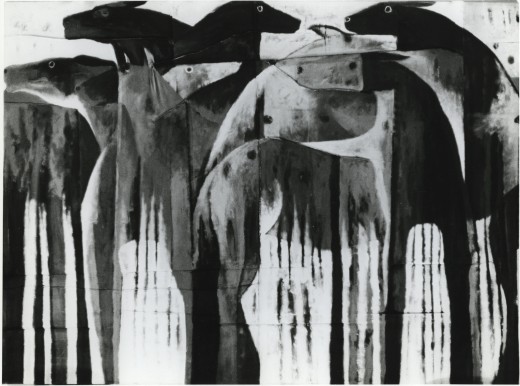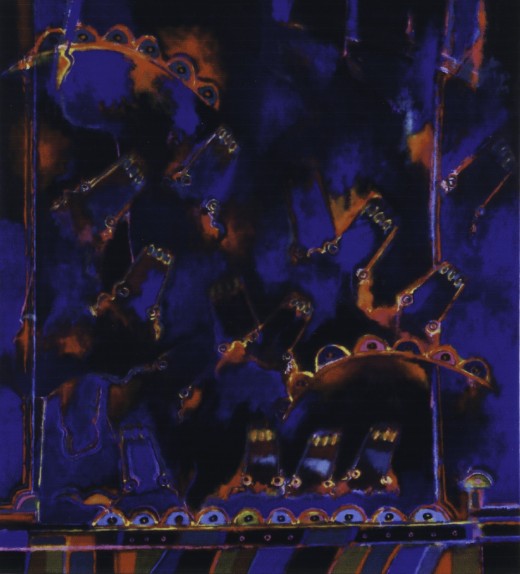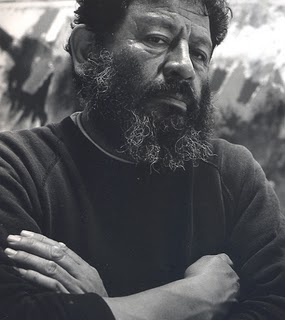Carlos Loarca, a Guatemalteco-born artist now living in San Francisco, is motivated by an instinctive drive to express powerful motives of pictorial nature, mainly of his native land. Since 1980, a reoccurent element of in Loarca’s work has been his depiction of “El Cadejo”, the mythical dog of his Gautelmateco past. The legend, in the form Loarca heard as a child, says that the Spirit Dog accompanies men home from the bars at night and safeguards them from harm. Loarca sees El Cadejo as a friendly soul, and perhaps a reflection of his past. The artist works in acrylic, mixed liberally with water, to render fluid images that capture (in the artist’s own words) “the sociological, psychological and philosophical aspects of the legend.” The subject matter revolves around variations of the legend with repeated Spirit Dog images in contemporary adaptations to the artist’s surrounding culture.
The vibrant cProxy-Connection: keep-alive
Cache-Control: max-age=0
ors in Loarca’s paintings are take directly from the colors of the clothing, marketplace and daily life of Guatemalans. The forms favored by the artist are simple geometric ones- the circle and rectangle-repeated in different configurations that tell the same story from various perspectives.
Carlos Loarca Artist Statement
“When I began to paint, my aim was never to master a craft. It was merely coincidences of opportunity, chance and discovery that brought my painting out to light. It was the mystery and the abstraction of the format of painting that intrigued me to find out what was going on in me. I wanted to find out what did happen to all my past (not what happened in my past), but rather where did it all go, and realizing the incredible amount of options that I could work with, I began to be involved with painting.
The most exciting part about painting is in the experience itself of doing it. When the actual painting is taking place the fantasy of the mind and the powers of creation help to bring our special surroundings about me in the studio. As the painting takes form, the head does not really understand what it is that it is doing. The inspiration seems to come from the void in the universe.
There are a lot of frustrations that occur when working on a painting, but that is because the painters is not allowing the art to take form, the head does not really understand what it is that it is doing. The inspiration seems to come from the void in the universe.
There are a lot of frustrations that occur when working on a painting, but that is because the painter is not allowing the art to take form. It is more like the painter imposing his/her own will of the art. Painting will always happen, and to this fact I will always be true.
I took one of the legends of the Indian nations from Guatemala and I focus on it to draw from the imagination. The legends tells of “El Cadejo”, one big black dog with shiny eyes who is the protector of drunks on their way back home from the “cantinas.” The dog meets the drunk man outside the door of the cantina and walks him home to the front steps. I felt this protection many times and even thought I was not living Quetzaltengango (where I was born), I always felt the protection of “El Cadejo.”
I do not drink any alcohol anymore, but the protection of the dog is still with me, and now I can feel his presence as I paint. What started as a simple legend in my childhood has flourished into a realistic fantasy and has become part of the world I live in.
The color in the paintings is a direct reflection of the colors of the Indian colors in their own costumes. I grew up seeing all these bright colors in the market, in the street and especially during all the festivities and celebrations in Quetzaltenango.
I often think that I am living in the past, but I also wonder if the public in general is not doing the same thing and just not being aware of it.”
-Carlos Loarca, February 1994




